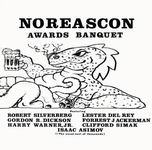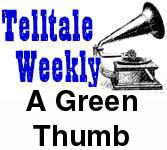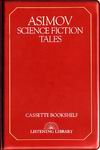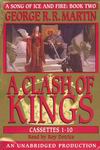
 Noreascon: The 29th World Science Fiction Convention Awards Banquet
Noreascon: The 29th World Science Fiction Convention Awards Banquet
Produced by William Desmond; Various Speakers
Two 33 1/3 RPM LPs – Approximately 90 minutes [UNABRIDGED EXCERPTS]
Publisher: Nesfa Inc.
Published: 1973 – Out Of Print
Themes: / Science Fiction / Awards / Fandom / Hugo Awards /
A set of two long-playing records of the Awards Banquet at the 1971 World Science Fiction Convention in Boston. The Toastmaster for the function was Robert Silverberg. In addition to the speeches by Guest of Honor Clifford D. Simak and Fan Guest of Honor Harry Warner, Jr., there is a eulogy for John Campbell given by Lester del Rey. Other speeches were given by the TAFF delegate (Mario Bosnyak) and the Bob Shaw Fan Fund winner (Bob Shaw). Awards were presented for First Fandom (received by Philinda Hammond for late father, John W. Campbell) and the P.A.T. Terry Award for Humour in SF. The Hugo Awards were presented by Isaac Asimov.
I had to find a working record player to play this set, something more difficult than I expected, but it was worth the wait. Recorded in real time, this is a collection of excerpts from the awards banquet, so there are some slow spots, a little dead air, but the energy and sheer voyeurism more than makes up for this. After all, listening to these LPs is for a science fiction fan what the Oscars are to a movie fan.
Toastmaster Robert Silverberg, who just this year (2004) has been named a “grand master,” sprinkles his 33 year old speeches with jokes, about Nixon, marijuana and other topical to 1971 themes – Silverberg also “roasts” many of his colleagues to his own and to the audience’s obvious delight. But Silverberg isn’t the only speaker. A somber and lamenting Lester Del Rey eulogized John W. Campbell and presented the first Fandom Award. Bob Shaw, specially imported to Boston just for the occasion made a brief speech full of warmth and humour and delightful Irish accent was a real treat! And Clifford D. Simak gave what sounded like a prepared speech – with some unfortunately insecure dentures. Simak’s unadulterated benevolence shone through – in his late 60’s by the time of this recording, he was the most eloquent speaker among all the honourees that night. Simak suggested in his speech that perhaps the “golden age”, wasn’t quite so golden as we all seem to remember and that the current ‘dry spell’ isn’t perhaps quite so dry. He extolled the virtues of the “new wave” and suggests that science fiction is stronger than it ever was, and that the expansion into the softer sciences of economics, ethics, sociology, etc. is actually a good thing. Simak’s conviction and good will brought genuine tears to my eyes and I wasn’t the only one moved. Simak’s speech was interrupted by spontaneous applause. After he’d concluded his speech he was again subject to a rousing and sustained round of applause and Silverberg said as Simak took his seat “He’s a good man, a pretty good writer too, we have a lot of good writers here tonight but he’s a good man”. We’ll miss you Cliff.
On Side 4 the serious handing out the “silver spaceships” began in earnest with Isaac Asimov as the dispenser. Asimov had even more fun with the microphone than did Silverberg, giving us a raunchy limerick and several references to himself as the worlds greatest science fiction author!
Larry Niven makes a brief vocalization too, after having been handed his Hugo for best novel (Ringworld), Niven said “I promised my wife I’d quit smoking right after this convention”. Thankfully Larry is still with us more than a third of a century later and no doubt we have his wife to thank for that.
Sound quality with this 1973 production is only fair, vinyl/needle friction combined with numerous microphone bumps, pops and hisses are only a minor annoyance, most speakers are easily heard, the audience laughs at all the jokes and everyone seems to be having a great time. The line drawing cover art is rudimentary and is taken from the program to the convention (click on the picture to see the expanded fold out cover), the inside of the 2 disc set is illustrated with black and white photos from Noreascon 1971. With only 300 of these record sets ever printed this is a mighty rare collectible, I’ll cherish mine until they invent that time machine these SF authors are always promising – then I can visit the convention myself!
Posted by Jesse Willis
 A Green Thumb
A Green Thumb A Hero Of The Empire
A Hero Of The Empire

